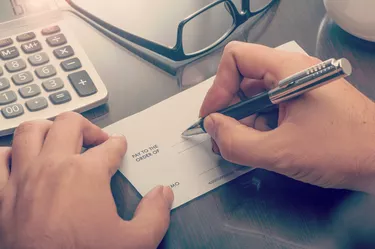As the executor of a person's will, your duty is to collect in the deceased's estate and administer it properly. Much of the process involves paying bills, expenses and taxes, and to do that, you'll need to sign checks from the deceased's bank account. Most people do this by opening a separate bank account in the name of the estate. Then, you can sign checks with your usual signature as the account executor.

Video of the Day
Make Your Appointment Official
Although the deceased's will might nominate you as executor, your appointment is not official until the probate court has rubber stamped it. Your first task, then, is to file a petition with the probate court in the county where the deceased lived. Different counties have different forms to fill out but generally, you'll confirm that you are willing to act as executor and provide a copy of the will. The court will check that the will is valid and give you a formal appointment, and then you can start the process of managing the estate.
Video of the Day
Open an Estate Account
As executor, it's your job to manage the deceased's bank accounts. The easiest way to do this is to open an estate checking account, which is registered like this: "Estate of Anthony W. Myers, Deceased, by Alicia Thomasson, executor." You'll need a copy of your probate paperwork and a Federal Tax ID number, which you can order online from the Internal Revenue Service. It's up to you to decide which bank you want to use, although it might be easier to stick with the deceased's usual bank if it's convenient. The bank will then transfer funds from the deceased's accounts to the estate account and close the deceased's personal accounts.
Writing Checks as Executor
You can start writing checks from the estate account as soon as you receive your checkbook. Since you are essentially the account holder, all you have to do is sign your name using the same signature you gave as a sample when you opened the account. You can print the designation "executor" after your signature if you prefer — "Alicia Thomasson, executor" — although this is not essential. Remember to record the check number, payee, date and amount in the check register. You have a legal duty to manage the estate in a fair and honest manner and keep records of your transactions. Some banks will give you duplicate checks so you have a copy of each check you write.
Simplified Processes for Small Estates
Each state has its own definition of a "small estate" but it's usually one valued less than around $50,000. If you're administering a small estate, you may not need to go through full-blown probate or open an estate account. A judge may simply issue a letter that grants you access to the deceased's personal bank account, and the bank may let you write checks directly from that account. Each bank has its own policy on how it deals with a deceased customer's bank accounts where there's no formal probate. Start by talking to the bank.